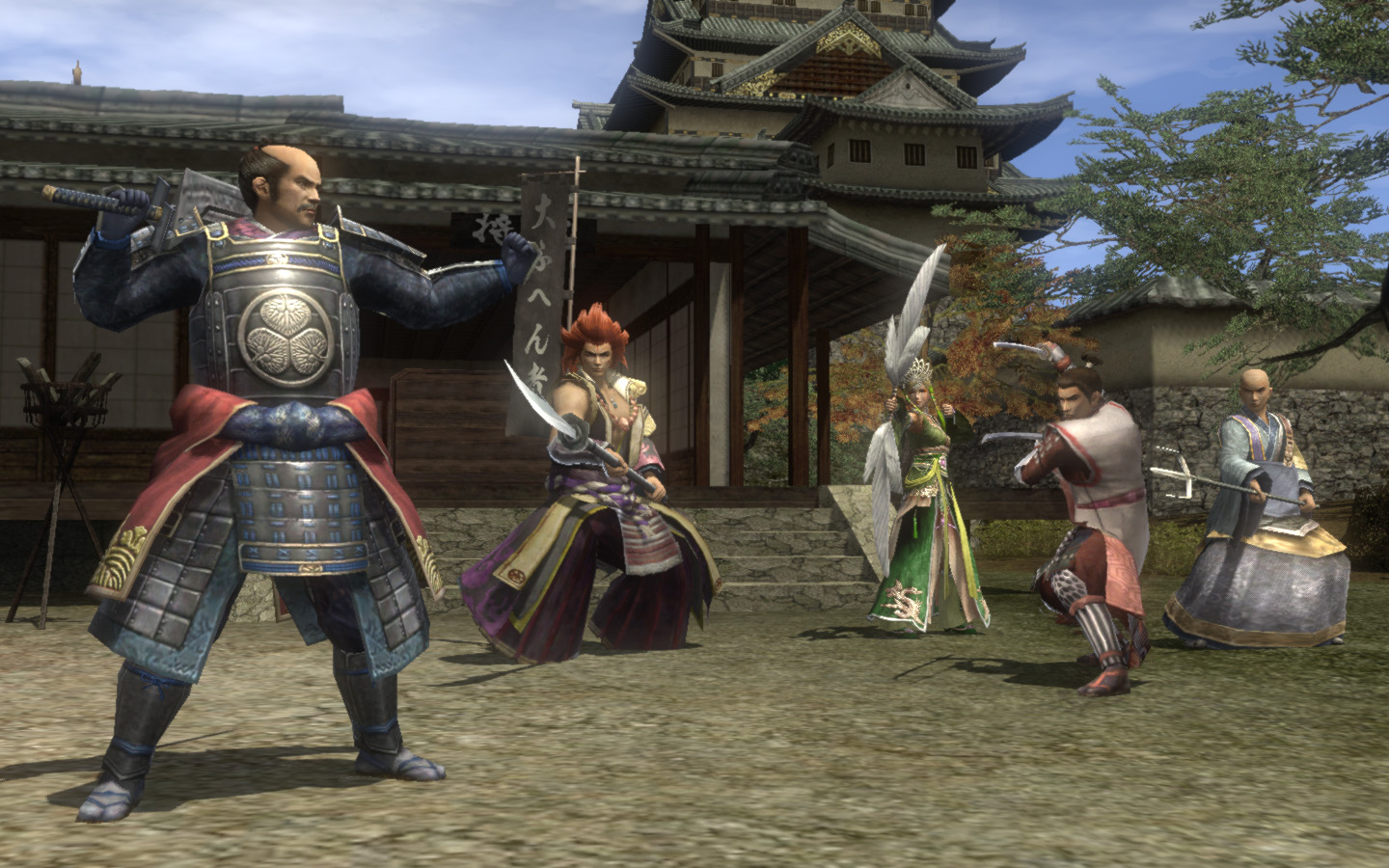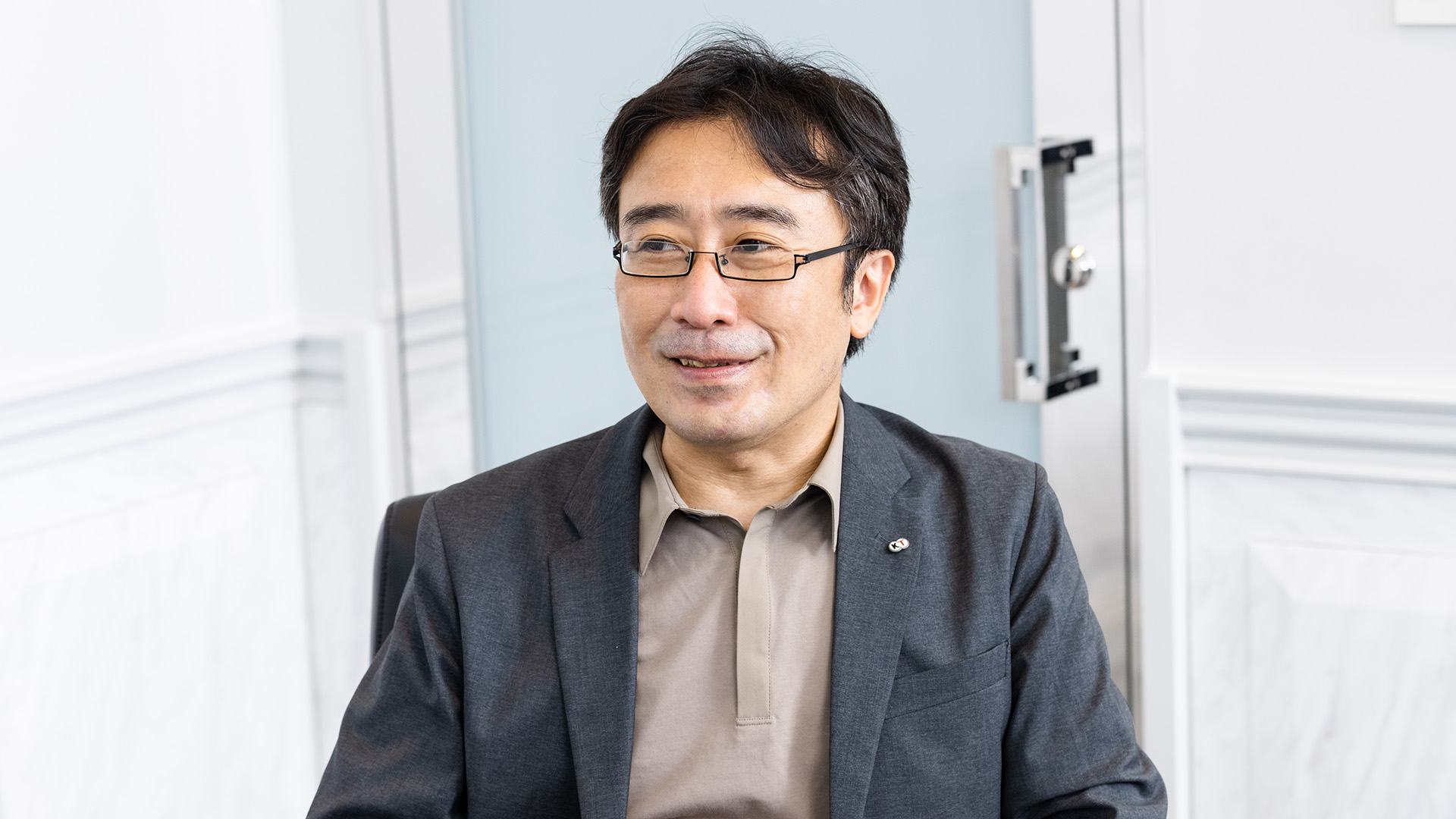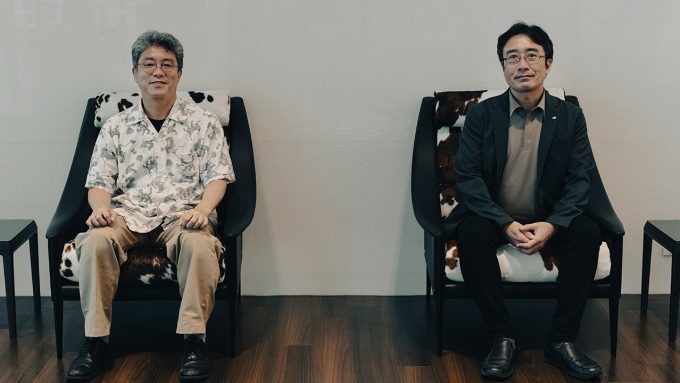“WE DISCUSS VANA’DIEL” is a series of conversations between Producer Matsui and special guests who are familiar with FINAL FANTASY XI (FFXI).
For our third guest, we invited Yutaka Kawamata, the producer of NOBUNAGA’S AMBITION Online (NAO). In this four-part conversation, the “comrades-in-arms” of two long-standing PlayStation 2 (PS2) MMORPGs came together to talk about their games!

Developer of NOBUNAGA’S AMBITION Online, an MMORPG based on the world of the NOBUNAGA’S AMBITION* series. In addition to his role as Director, he has assumed the position of Producer as of June 2019.
* NOBUNAGA’S AMBITION is a series of historical simulation games set in the Sengoku period of Japan, the first of which was released in March 1983. The series has continued to evolve since then, and the upcoming 16th title in the series, NOBUNAGA’S AMBITION: Shinsei, is scheduled to release this winter.
 NOBUNAGA’S AMBITION Online is an ongoing popular online RPG based around the premise of living in the world of the Sengoku period. Players may serve under prestigious clans such as Oda, Uesugi, Takeda, and Date, and fight their way through large-scale battles of up to a thousand players in the name of uniting the country under one rule.
NOBUNAGA’S AMBITION Online is an ongoing popular online RPG based around the premise of living in the world of the Sengoku period. Players may serve under prestigious clans such as Oda, Uesugi, Takeda, and Date, and fight their way through large-scale battles of up to a thousand players in the name of uniting the country under one rule.
Everything started with a directive from Mr. Kou Shibusawa
Our guest is Yutaka Kawamata from Koei Tecmo. Please tell us about yourself and your work history.
- Kawamata
In 1997, I joined Koei (as they were known at the time) as part of the NOBUNAGA’S AMBITION: Shouseiroku team and was tasked with porting the game to the PlayStation. Later on, I assisted with Zill O’ll and was in charge of the successor system* in Genghis Khan: Aoki Okami to Shiroki Mejika IV. After that, I was part of the Harukanaru Toki no Naka de team for a while, then following my involvement in Romance of the Three Kingdoms VIII, I joined the NAO team.
* The successor system is a major component of the Aoki Okami to Shiroki Mejika series wherein the hero may seduce a queen to yield progeny. Male progeny can be enlisted as potential generals, while female progeny can be wedded to potential generals to guarantee their absolute loyalty.* Referring to Mr. Matsui’s position as FFXI Producer. The position of FFXI Director is held by Mr. Fujito.
There was a period when I briefly stepped away from NAO, and after my return I assumed the role of director, then assumed the roles of both producer and director in 2019. Since I became a producer relatively recently, in that sense, Mr. Matsui is an esteemed veteran I look up to*. - Matsui
I’m flattered, though Mr. Tanaka (Hiromichi Tanaka, original producer of FFXI) was the producer during most of the troublesome periods and I simply keep an eye on the development team and community.
By the way, NAO launched in 2003, but when did you join their development team, Mr. Kawamata? - Kawamata
It was around 2002. I’ve been part of the team since before the launch.
- Matsui
Were you a game planner when you originally joined?
- Kawamata
Yes. As a game planner, I was in charge of aspects like the UI (user interface) and stage design.
Because our first platform was the PS2, I assumed many players wouldn’t have a keyboard, and came up with a simplified chat system as an alternate means of communication. I was also in charge of UI-related aspects for the Windows version and was mostly involved with 3D aspects and UI after that. Seeing as FFXI launched in 2002 and NAO launched in 2003, I imagine both games were in development around the same time. What were the circumstances that led to the beginning of NAO’s development?
- Kawamata
Since I wasn’t there in person, I asked Kenichi Ogasawara (Entertainment Division Managing Executive Officer), who was the director at the time. According to Ogasawara, he was called into the CEO’s office by Kou Shibusawa (pseudonym of Yoichi Erikawa, President & CEO of Koei Tecmo) who told him straight up, “I want to make an MMORPG of NOBUNAGA’S AMBITION.”
* Rakchu Rakugai are paintings done on folding screens depicting the cityscape or outskirts of Kyoto, the former capital of Japan. They were primarily painted between Japan’s Sengoku and Edo periods.
He pointed at a Rakuchu Rakugai folding screen* in the room and said, “Like this!” to which Ogasawara apparently replied “O-okay,” and that was how it all started. (laughs) - Matsui
That might be similar to our experience with Mr. Sakaguchi (Hironobu Sakaguchi, founder of the FF series). (laughs) Mr. Tanaka mentioned this as well, but FFXI began in a similar manner.
By the way, I was curious why NOBUNAGA’S AMBITION was selected to become an MMORPG. I felt that another Koei title, Uncharted Waters, might be more suited for an MMORPG adaptation, but now I know that Mr. Kou Shibusawa’s directive was behind that decision. Does that mean he wanted to compete in the genre using NOBUNAGA’S AMBITION?
- Kawamata
NOBUNAGA’S AMBITION is one of our flagship IPs (intellectual properties), and I think he wanted to maintain its status in the world of MMORPGs as well. At the time, MMORPGs were dominated by Ultima Online and EverQuest. Many of our staff members were impressed with these games from overseas, and some of them even kept a daily journal of their adventures.
* Ultima Online is a game released in 1997 widely considered to be a pioneer of the MMORPG genre. * EverQuest is an MMORPG released in North America in 1999.
I imagine Kou Shibusawa noticed this trend and felt, “If we make an MMORPG, it should be based on history.” It’s very impressive how Mr. Kou Shibusawa caught onto these trends.
- Kawamata
However, we all had our doubts about whether MMORPGs would gain popularity in Japan. We were obviously trying to create something we thought would be fun, but back in the day, many people were still unaccustomed to using chat to communicate with others. I myself remember typing nervously with trembling hands when I played an online game for the first time.
These uncertainties persisted as NAO development progressed, but then FFXI launched before us, and I remember telling our development team, “Hey, FFXI seems to be doing pretty well!”
When samurai and ninja were announced for Rise of the Zilart...
Backtracking a little bit, when development for NAO began, I’m sure you were still unaware that FFXI was also being developed. What were your feelings when FFXI was released?
- Kawamata
To quote Ogasawara, “They beat us to it!” (laughs)
- Matsui
Mr. Sakaguchi was pushing very hard for FINAL FANTASY to become as well-known as DRAGON QUEST*. As such, we were under strict orders to release new ideas as soon as we could in order to remain noteworthy compared to other games. In practice, however, there was no way for us to know what other companies were working on until they made an announcement.
* The first DRAGON QUEST title was released in May 1986 and popularized the RPG genre in Japan. Comparatively, the first FINAL FANTASY title was released over a year later in December 1987. I’m sure development on an MMORPG was especially kept as an utmost secret.
- Kawamata
Making announcements introduces all sorts of side effects, after all.
Although they got ahead of us, FINAL FANTASY is different from the world of NAO, so we were more like, “FFXI is doing well, so let’s do our best too.” However, when we heard that samurai and ninja were to be added in Rise of the Zilart, we thought, “They’re bullying us!” (laughs) (everyone laughs)
- Matsui
In our defense, we’d already planned up to Rise of the Zilart at the beginning of development, and samurai and ninja were already popular jobs in the FINAL FANTASY series, so it wasn’t intentional.
With that said, in addition to the two Japanese-themed jobs, Rise of the Zilart was released in April 2003, whereas NAO started in June 2003 and ended up falling behind.
- Kawamata
We were like, “Seriously?!”

Formerly rivals, now comrades-in-arms
Since NAO was your first attempt at the unfamiliar genre of MMORPGs, were there any games you referred to as an example?
- Kawamata
Ultima Online and EverQuest were model examples, as you might expect, and we played them a lot.
Later on, in the process of adapting NOBUNAGA’S AMBITION into an MMORPG, we debated points such as how the setting should be tailored to incorporate large-scale battles, or which ideas we wanted to borrow from existing games while maintaining elements unique to NAO.
For instance, we felt that common gaming terminology from other games could be localized into Japanese to better suit our world, so “party” became “faction”, and “shout chat” became “loud voice.” However, certain words like “level” and “events” just couldn’t be localized very well in the setting, so despite our efforts, some words were left as-is in katakana, which I thought was rather interesting. - Matsui
I see, so you had to contemplate between recognizability or immersion.
Aside from EverQuest and Ultima Online, were there any other MMORPGs you were paying attention to?
- Kawamata
As you may have guessed, we were paying attention to FFXI and played it as well. My friends were playing it, and even though we felt like we were overtaken, our staff members were also playing quite a bit.
In FFXI, there are many players from other countries, and quite often you’ll see English words in the chat or receive a casual invitation to their parties. I remember thinking, “Wow, it’s so international in here,” and feeling a little out of place.
While I was impressed that a Japanese title like FFXI had been designed in this manner, I also gained confidence that the game we were making would be unique. Of course, there were still many aspects where we looked to FFXI as an example. Was FFXI more like a subject of research rather than a rival?
- Kawamata
In some ways, we certainly saw FFXI as a rival at the time. But nowadays, I feel like we’re more like close comrades-in-arms. Not that we’ve ever had a collaboration or any direct interactions, however.
On the topic of “comrades-in-arms,” an important commonality between FFXI and NAO is that both games launched on the PS2. From what I understand, NOBUNAGA’S AMBITION was quite popular with the PC audiences as well, and NAO likely would’ve done very well as a PC game too. What were the reasons behind launching the game on the PS2?
- Kawamata
NAO is an RPG before it is an MMORPG, which may have been why we wanted to launch on a household gaming console. Furthermore, we were aiming to become the first PS2 MMORPG, which was probably also the case for FFXI.
- Matsui
It seems both of our leaders had quite the foresight.
On the other hand, launching on a household gaming console meant that many players were unfamiliar with online games, which I imagine led to many difficulties.
- Kawamata
Since we didn’t have social media such as Twitter and Facebook back then, we really had no clue what to expect when it came to online disputes, or what was necessary for everyone to play the game enjoyably.
We added a blacklist feature (referred to as “severance system” in NOBUNAGA’S AMBITION Online) and other similar features, but we continued to consider many other ideas as development and operations progressed.
While it’s not exactly noticeable from an outside perspective, we were extremely cautious about how we dealt with disputes. NAO also had Game Masters (GMs) to deal with issues, though they rarely reveal themselves nowadays. As they resolved disputes, we accumulated knowledge and experience which led to the addition of new features as operations went on. - Matsui
It was a time when the internet itself was starting to become more widespread.
- Kawamata
This is a story I recently heard when catching up with one of the GMs, but apparently there was a past incident involving a dispute between several tens of players.
Apparently, the GM appeared before the players and told them, “Hey, let’s all sit down right here. You won’t be able to enjoy the game if you continue this animosity, right?” and mediated the groups to a resolution. When I heard about these bygone days and how the GMs handled these situations, I couldn’t help but laugh at how picturesque it all sounded. (laughs) Back then, GMs procedures weren’t really set in stone. Which reminds me, I remember when GMs appeared in FFXI, players would always crowd around them and form a giant cluster.
- Matsui
Similarly in FFXI, we don’t have many cases that call for GMs to show themselves nowadays. Most of the problems we face today are related to RMT and bots (characters using fraudulent programs to perform repetitive actions).
Those are handled by keeping an eye on reported characters, then suspending or banning their accounts in the case of a violation, so there’s little need for GMs to go out of their way and reveal themselves. Furthermore, even if there were a dispute, they can communicate through tells (one-on-one conversations) if there’s no need to include a third party in the conversation. - Kawamata
Since 18 years have passed, I imagine a part of that can be attributed to players and the overall community maturing to a point where player disputes have become less frequent.
- Matsui
I agree. It might be more effective for GMs to reveal themselves when it comes to player disputes, but I think we’ve had fewer cases like that in general.
- Kawamata
Newcomers are less likely to experience major disputes now that players who grew up with the game are guiding the community, so I imagine problems have taken on a different nature since launch.




